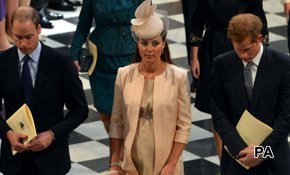John Humphrys asks: will the privileges of the Royal baby undermine British democracy, and should its life be predetermined?
Any day now a baby will be born who is destined, if life follows its usual pattern, to be our monarch after the one after next. Its birth will be heralded as a mark of the extraordinary stability of the British state: we’ll know who the head of that state will be pretty much for the next hundred years. Is that stability a good thing or a regrettable constraint on change? Is the baby blessed to be born into a position of unequalled privilege, or unlucky to have its life determined for it without its choice?
The Queen is reported to have told a schoolchild this week that she hoped her great-grandchild would be born before she went on holiday so it’s likely that by the time you are reading this the world will be celebrating the arrival of the third in line to the throne after the Prince of Wales and Prince William.
Unless the child’s name is announced at the very moment of its arrival, there will be more than enough speculation to fill every other newspaper column in the land. Not that its name will necessarily have any bearing on what title it will take as monarch. The mysterious powers that decide these things often pull surprises. Queen Victoria’s eldest son (as Prince Charles is well aware) had to wait until he was seventy before ascending the throne. He was known universally as Bertie (after his father, Prince Albert) during his long career as Prince of Wales. But he became Edward VII. His grandson was known as David when heir to the throne but assumed it as Edward VIII and when he abdicated his brother (Bertie too) became George VI. It cannot be taken for granted that Prince Charles will become King Charles III or Prince William, William V.
But the choice of name is perhaps significant in a different sense. Those who attack the institution of the monarchy argue that it, more than any other social force in our country, perpetuates the class system, a system of social division held to be more intense and more damaging than in any other country that calls itself democratic. So choosing a non-posh name would be a great way to mitigate the damage, they say. How about a Prince Tyler or a Princess Charlene? The very idea would cause apoplexy in the stuffier regions of the court circle. But then that might be the intention.
But it’s the destiny of the child rather than its name which is likely to be the source of the strongest argument, an argument with which we’re all very familiar but which the arrival of a future monarch is certain to trigger off.
Defenders of the monarchical system say it creates stability and continuity in a world that is otherwise in constant change. It is a matter of immeasurable value, they say, to have as head of state someone who is there by longstanding right rather than by our fickle choice. It’s especially valuable that that figure should not be a politician, as presidents of republics so often are, because politicians inevitably disappoint; their actions often have consequences that make us fear for the future of our country. But the monarchy symbolises the reassurance that our fate is not wholly in the hands of elected opportunists and the hope that when things are bad they need not remain that way. Why would we prefer a superannuated, second-rate politician to be appointed as president or, worse still in this era of celebrity, give the public the opportunity to elect as head of state someone frivolous and popular this year who will be a tarnished has-been by next?
To which republicans reply with one word: democracy. How can we possibly pride ourselves on being a democracy (as we do) when we don’t elect our head of state but have it chosen by the arbitrariness of birth? What’s more, they say, in retaining the monarchy we have also retained the undemocratic exercise of real powers that ought to be subject to democratic control. It’s true that the monarch herself does not exercise these powers, but her prime minister does in her name. Only by doing away with the monarchy can we seize back these powers for democracy. And as for the notion of stability, they say, that’s just a euphemism for social sclerosis and the perpetuation of privilege.
But what of the baby itself? It is the very privilege of the life it is being born into that outrages those hostile to the institution of monarchy. Don’t we believe in greater equality, or at least in a meritocracy where’s people’s status is a product of their ability and effort? So isn’t it an affront to such notions that we should endow a baby with a future of comfort, leisure and wealth (all at our expense) irrespective of how it lives its life?
Yet there is a wholly different way of looking at this. Might we be denying this new baby its human rights by determining its future from the outset? Is it not a form of captivity we are imposing, almost randomly, on this particular baby? If we believe in freedom, can we be justified in demanding of this child something we demand of no other, that its whole life course should be settled in advance?
What we can all agree on is that we wish this baby, like any other, a happy, healthy and long life. But what else do we think about this particular child?










